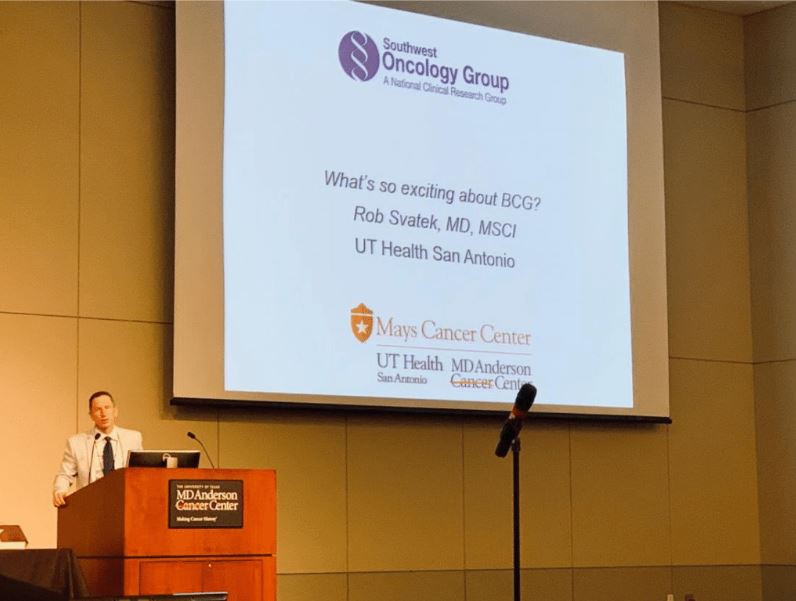Dr. Svatek discussed the fact that there are several BCG strains, having evolved from in vitro passaging over time in different laboratory conditions worldwide. BCG shortages in the United States have made treatment of non-muscle invasive bladder cancer more challenging. Dr. Svatek notes that there remains only a single manufacturer of the TICE strain of BCG in the US at the present time. The different strains of BCG have been postulated to have different efficacies, and a meta-analysis by Boehm et al suggested that the Tokyo-172 strain may be the most effective1.

The S1602 SWOG Intergroup trial (NCT03091660) was borne partly out of this observation, along with studies that suggested that prior exposure to BCG antibodies may confer additional treatment benefit.2,3 The trial compares TICE BCG to Tokyo-172 BCG in a non-inferiority design, and as a second objective, randomizes patients to Tokyo-172 BCG with or without an intradermal vaccination of Tokyo-172 BCG prior to intravesical instillation.
The mechanism of BCG therapy is not well understood. Both innate and adaptive immune cells play a role. In patients who were primed with BCG vaccination, Dr. Svatek’s group found that there was a significant increase in natural killer cells as well as γ∂ T cells. In murine studies, knockout of γ∂ T cells leads to loss of BCG efficacy. In contrast, regular T cells contribute partly to BCG’s efficacy, but they are not indispensable, according to Dr. Svatek.
The S1602 trial is currently accruing patients. A key benefit of BCG vaccination is its low cost (averaging $2.50), considerably lower than other novel immunotherapy agents also emerging in the bladder cancer treatment space.
Presented by: Robert Svatek, MD, Associate Professor, Department of Urology, UT Health Science Center, San Antonio, Texas
References:
1. Boehm BE, Cornell JE, Wang H, Mukherjee N, Oppenheimer JS, Svatek RS. Efficacy of bacillus Calmette-Guérin Strains for Treatment of Nonmuscle Invasive Bladder Cancer: A
Systematic Review and Network Meta-Analysis. J Urol [Internet].2017 Sep;198(3):503–10.
2. Niwa N, Kikuchi E, Matsumoto K, Kosaka T, Mizuno R, Oya M. Purified Protein Derivative Skin test prior to bacillus Calmette-Guérin Therapy May have Therapeutic Impact in Patients with Nonmuscle Invasive Bladder Cancer. J Urol [Internet]. 2018 Jun;199(6):1446–51.
3. Biot C, Rentsch CA, Gsponer JR, Birkhäuser FD, Jusforgues-Saklani H, Lemaître F, et al. Preexisting BCG-specific T cells improve intravesical immunotherapy for bladder cancer. Sci Transl Med [Internet]. 2012 Jun 6;4(137):137ra72.
Written by Dr. Vikram M. Narayan (@VikramNarayan), Urologic Oncology Fellow with Ashish M. Kamat, MD (@UroDocAsh), Professor, Department of Urology, Division of Surgery, The University of Texas MD Anderson Cancer Center, Houston, TX at the 13th Update on the Management of Genitourinary Malignancies, The University of Texas (MDACC - MD Anderson Cancer Center) November 9-10, 2018, Dan L. Duncan Building, Houston, TX


